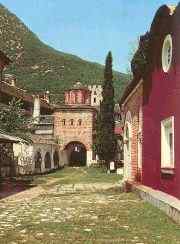As I asked questions about Crete, a co-worker of mine advised that I read Nikos Kazantzakis's Report to Greco. I had never read Kazantzakis before--his most famous book was Zorba the Greek, and he also wrote The Last Temptation of Christ. Both were before my time, as novels go, I guess.
It was a pleasant surprise for me, then, when I got the book and found it fascinating. It is an autobiography of sorts, tracing the ways he developed as a writer and a thinker. Importantly for my project, he describes his homeland of Crete in glowing detail, and he includes two chapters about his visits to Knossos, palace of King Minos.
I am only halfway through the book--at the point where he has graduated from college, but his idealism is still incredibly real to him. In the chapter "My friend the poet, Mount Athos," he describes a pilgrimage he made to Mount Athos, a sacred site for believers in Eastern Orthodox Christianity.
One of the things that strikes me about Kazantzakis's writing is how effortlessly he addresses the spiritual world in his writings. To me this is a peculiar, Eastern way of thinking and writing. In the West, we are obsessed with reality--bending and shaping it through the application of science. We revere the material, and our worship reflects this preoccupation--as if somehow by harnessing the material around ourselves (food, dress, word and deed) we can "prove" the reality that God's Spirit is alive and well within us.
Mount Athos is/was a place where monks and pilgrims come to shed material things altogether. Kazantzakis arrives as a very enlightened man, proud of his own view of the world. In the progress of visiting the different monasteries, however, Paradise--God Himself--becomes very real to him. He leaves with a different sort of enlightenment.
Drawing from his diaries Kazantzakis describes each of the monasteries he and his friend visited. I wish I had time to describe them all. Instead I will comment upon two of the visits.
 At Aghias Lavras Monastery (pictured), Kazantzakis learns of the Byzantine Emperor Nicephorus Phocas, who felt drawn to the monastic life there on Mount Athos. His crown was heavy. He wished to cast it aside and retire to Aghias Lavras. Only one thing kept him from doing so: his harem. He procrastinated the call until the day came when one of his closest friends pulled out a sword and cut off his head. This case is presented as heaven being available to the Emperor at any moment he chose to renounce the world--and that same heaven becoming closed to him when his life expired.
At Aghias Lavras Monastery (pictured), Kazantzakis learns of the Byzantine Emperor Nicephorus Phocas, who felt drawn to the monastic life there on Mount Athos. His crown was heavy. He wished to cast it aside and retire to Aghias Lavras. Only one thing kept him from doing so: his harem. He procrastinated the call until the day came when one of his closest friends pulled out a sword and cut off his head. This case is presented as heaven being available to the Emperor at any moment he chose to renounce the world--and that same heaven becoming closed to him when his life expired.There is an antipathy towards women in much of the writing, which some readers might find offensive. Even today, women are not allowed to visit any of the monasteries on the peninsula--they are not even allowed to set foot on the docks. The feeling conveyed by Kazantzakis is that women are the most luxurious and tempting of material possessions. They are banned from the monastic communities (even today women may not even set foot upon the shore) not for what they themselves have done but what men fear they themselves might do with them around.
One story demonstrates both the bizarre anti-female attitude and the sublime
sence of mysticism that Kazantzakis discovered there:
It seems that a girl came to [St. Antonius] one day and said,
"I have observed all of God's commandments; I place all my trust in the Lord. He will open the gates of paradise for me."
Saint Antonius then asked her, "Has poverty become wealth for you?"
"No, Abba."
"Nor dishonor honor?"
"No, Abba."
"Nor enemies friends?"
"No, Abba."
"Well then, my poor girl, go and get to work, because right now you possess nothing."
To the mystic, Heaven is everywhere. God searches for man as enthusiastically as we search for Him. The only material proof of this Spiritual Enlightenment, however, is absolute and utter rejection of material things--much as Christ stipulated for the Rich Young Ruler. Wisdom isn't earned. It is plucked from the ether by the open hear.
I have to admit that I find such a spiritual existence compelling and fascinating. I don't think I could ever completely surrender my Western view of Earth & Heaven. I am open, however, to reading more Eastern writers and gaining insights from them about how to experience God and the Spiritual Realm at all moments of the day.
No comments:
Post a Comment